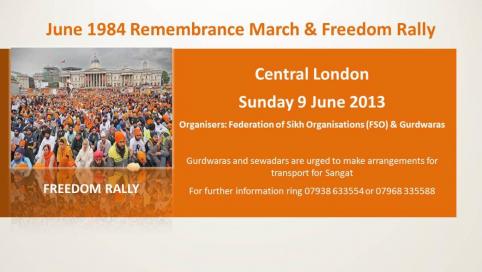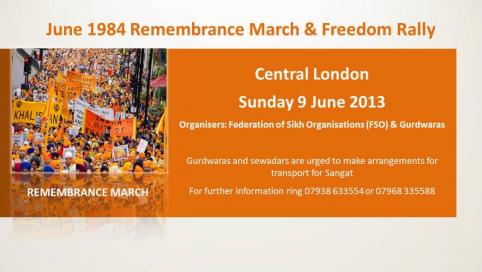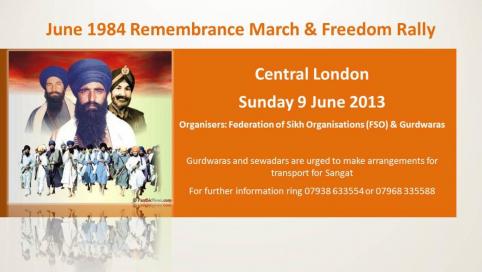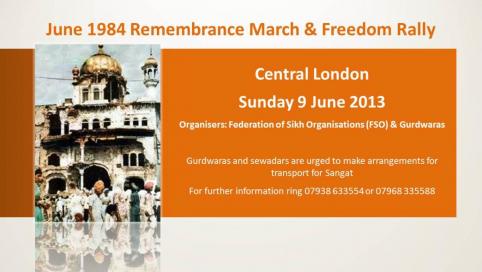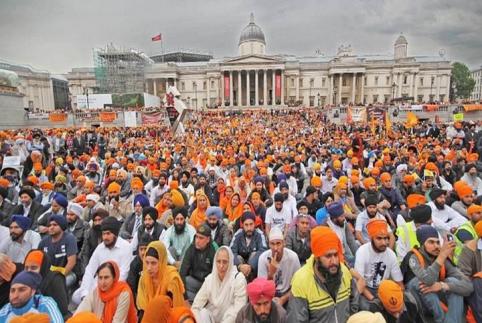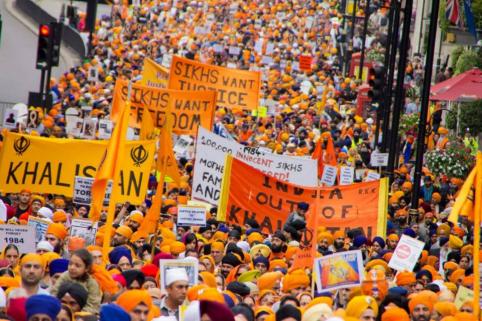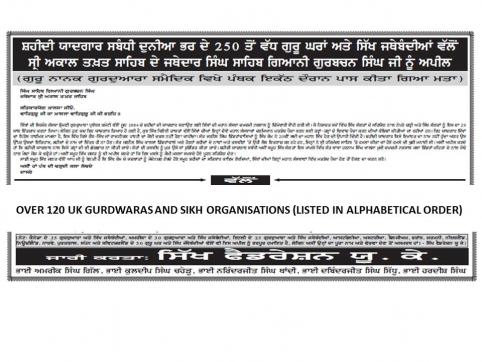
JagtarSinghKhalsa
Members-
Posts
2,970 -
Joined
-
Last visited
-
Days Won
3
Content Type
Profiles
Calendar
Forums
Everything posted by JagtarSinghKhalsa
-
http://www.sikhsiyasat.net/2013/06/06/uk-sikhs-prepare-for-genocide-remembrance-march-freedom-rally-in-london/ This article has also produced the background information attached to the Sikh Federation (UK) Press Release: Background information In June 1984 around 150,000 Indian army troops were sent to Punjab, the Sikh homeland, equipped with helicopter gunships and tanks to apprehend a handful of Sikhs inside the Golden Temple complex. A curfew was announced and Punjab was totally under army control. Telephone lines were cut and all press reporters were asked to leave. The Times reporter Michael Hamlyn reported that journalists were picked up from their hotels in a military bus, taken to the adjoining border of the state of Haryana and "were abandoned there". A group of journalists who later tried to drive into Punjab were stopped at the road block at the Punjab border and were threatened to be shot if they proceeded. Indian nationals who worked with the foreign media were also banned. The press criticised these actions by the Indian Government as an "obvious attempt to attack the temple without the eyes of foreign press on them". Surrounded by military troops, the State was completely disconnected from rest of the world. Nobody was allowed to enter or leave. The self-proclaimed largest democracy had set the stage for what was to follow; a deliberate, cold-blooded massacre of her own citizens, by the state establishment itself. The Indian army unleashed a terror unprecedented in post-independence India. Several thousand Sikhs became the target of the massacre by the Indian army. Priceless Sikh artefacts and literature was burnt. The Library in the Golden Temple complex was destroyed and documents, manuscripts of great importance to the Sikhs were either destroyed or taken by the Army. 29 years later the Sikh community is still awaiting the return of those items taken, which were not destroyed. An enormous number of pilgrims were murdered or mercilessly exterminated. A correspondent of the Associated Press, Brahma Chellaney, the only foreign reporter who managed to stay on in Amritsar, reported that suspected Sikh militants had been shot with their hands tied. Also, no efforts were made to identify the dead. No relatives were informed. Hesitant to turn over the bodies, the Indian government cremated them immediately making sure that no autopsies could be performed and no precise body count was made. Perhaps, the exact number of unarmed men, women and children killed by the hands of their own government will never be known. Indira Gandhi first asked Lt. Gen. S. K. Sinha, then Vice-Chief of the Indian Army, to prepare a position paper for an assault on the Golden Temple. Lt. Gen. Sinha advised against any such move, given its sacrilegious nature according to Sikh tradition. He suggested the government adopt an alternative solution. As the Vice-Chief of the Indian Army he was widely expected to succeed General K. V. Krishna Rao as the Army Chief. It was therefore a surprise to him and many others when he was overlooked and Lt.-Gen. A. S. Vaidya was appointed as the Chief of Army Staff. After which General S. K. Sinha submitted his resignation. He criticised the Government's claim that the attack represented a "last resort" and pointed out that the army had been rehearsing the operation in a life size replica at a secret location near Chakrata Cantonment in the Doon Valley for more than a year. Also he said a few days before the Operation; the Home Minister had announced that the troops would not be sent to the Golden Temple. The fact that the attack was then deliberately carried out on a day in which thousands of pilgrims were visiting the Golden Temple to pay their respects and remember the martyrdom of the fifth Sikh Guru, Guru Arjan Dev Ji is indefensible. Many Sikhs view the timing and attack by the Indian Army as an attempt to inflict maximum casualties on Sikhs and demoralise them. BBC reporter Mark Tully in his dispatches during and just after the bloody massacre of Sikhs in June 1984 states: ‘even if the arguments against a siege are accepted, they don’t justify the army’s decision to mount the operation while Sikhs were celebrating the anniversary of the martyrdom of Guru Arjan Dev Ji, who had built the Golden Temple and compiled the Guru Granth Sahib Ji. This inevitably compounded Sikh anger about the operation. It also meant that the temple complex was particularly crowded and this was why so many civilians were killed.’ The army lost more than 300 military personnel in the assault on the Golden Temple complex according to official figures, while others estimate this number to be well over a 1,000. Army officers were rewarded with medals for gallantry while killing hundreds if not thousands of unarmed men, women and children. The follow up army operation spread the destruction to other Sikh places of worship (Gurdwaras). The Army simultaneously attacked other Gurdwaras and caused considerable bloodshed. According to one Canadian Government report up to 125 Gurdwaras were attacked of which 38 were historic Gurdwaras. The army was given powers equal to martial law to clear villages of “militants”. Strict censorship, including a blanket ban against foreign press entering the state of Punjab, made this army operation secret to the outside world. It later transpired that during this operation thousands of Sikhs, overwhelmingly young men, were detained for interrogation and subsequently tortured. According to one estimate about 100,000 youth had been taken into custody within the first four to six weeks of the operation and many of them were not heard of again. Indira Gandhi could have delayed action but she realised voters were beginning to think she lacked the will to act. In search of political gain, countless Sikhs were murdered and no one has been held accountable. Twenty nine years on, there has still not been any independent inquiry on exactly what happened and no apology from the Indian Government for the killing of innocent civilians by the Armed forces deployed and or punishment of those that were involved in the killings. The Indo-Sikh conflict, is still continuing and has seen the Sikhs suffer genocide and the denial of freedom by force; the conflict remains unresolved and many of those guilty of inhuman crimes against the Sikhs remain unpunished, holding high profile positions of power in India. The mass killings of Sikhs in November 1984 in Delhi and over 130 other towns and cities in India are a classic example and no objective commentator can, after 29 years of failure in the Indian judicial system, realistically hope that justice will be delivered by the Indian courts. It is time that the perpetrators, such as Sajjan Kumar, Jagdish Tytler and Kamal Nath are tried where possible in international courts and the British Government can play an important role alongside the United States given their central position on the UN Security Council. The Indian authorities acquitted Sajjan Kumar in April 2013 while five others were found guilty using the same evidence. This has resulted in unparalleled mass protests in Delhi by Sikhs and non-Sikhs. The Supreme Court decision in relation to Professor Davinderpal Singh Bhullar on 12 April 2013 has also seen widespread condemnation from the EU, Germany, France, Canada and the UK as well as many former judges and senior police officers in India at what is clearly a blatant miscarriage of justice. The Indian Government refuses to ratify the UN Conventions against torture and enforced disappearances. However, those responsible for these human rights violations, members of the Punjab Police, including the current Punjab police chief Sumedh Saini, have not as yet, been brought to trial and justice received, despite documented and actual evidence against them.
-
SIKHS PREPARE FOR ANNUAL REMEMBRANCE MARCH & FREEDOM RALLY IN LONDON - BHAI AMRIK SINGH Thursday 6 June 2013 Tens of thousands of Sikhs will gather in London on Sunday 9 June to mark the 29th anniversary of the Indian army attack on the Golden Temple complex in Amritsar in June 1984. Sikhs from across Britain will begin to assemble in Temple Place and Surrey Street near Temple tube station. The remembrance march led by the Panj Pyare (five beloved ones) with swords drawn will begin in the Strand near the Indian High Commission at around 1pm. The march will head for Trafalgar Square and then pass through Whitehall where Sikh representatives will stop at 10 Downing Street and deliver by hand a memorandum for the British Prime Minister, David Cameron. This year the memorandum is being delivered a few months after David Cameron became the first ever sitting British Prime Minister to visit and pay his respects at the Golden Temple. Sikhs are hopeful he now has a much better understanding why Sikhs worldwide remain deeply dismayed and angered by the actions of the Indian authorities in sending in troops to the holiest of holy places for the Sikhs and killing hundreds if not thousands of pilgrims - innocent men, women and children. On the back of David Cameron’s visit and first-hand experience of the Golden Temple Sikhs will be renewing their call for the support of the British Government as a permanent member of the UN Security Council to tackle the continued injustices Sikhs face within India. This includes asking for an Independent UN led enquiry into the treatment of Sikhs in India from June 1984 onwards. After calling at 10 Downing Street the march will continue past the Foreign and Commonwealth Office, enter Parliament Square, go past the Houses of Parliament and end with a two-three hour freedom rally in the Millbank lining the River Thames. Numbers taking part in the march and rally are expected to be so significant that police are preparing to close the Millbank from Lambeth Bridge with Sikhs heading back as far as the Houses of Parliament and Parliament Square. In the last 12 months there has been unprecedented activity by British Sikhs in relation to human rights and the use of the death penalty in India. A 100,000+ petition was handed in at 10 Downing Street in December 2012, a Parliamentary debate on the death penalty in India took place in February 2013 and continued peaceful demonstrations have also taken place, including a mass protest on 15 April 2013 regarding the failings of the Indian judicial and political system as regards the imminent hanging of Professor Davinderpal Singh Bhullar. Bhai Amrik Singh, the Chair of the Sikh Federation (UK) said: ‘Ultimately, the only solution to conflict in Punjab will lie in the exercise of self-determination by the Sikhs, in accordance with international law, by which means the Sikhs will be able to protect themselves, their natural resources and their “honour, dignity and independence”. We are committed to peaceably establishing an independent sovereign Sikh homeland, a state often referred to as Khalistan that will provide lasting stability in the region. http://www.punjaboutlook.com/sikhs-prepare-for-annual-remembrance-march-and-freedom-rally-in-london-bhai-amrik-singh/
-
Sunday 9 June 2013 Assemble from 11am at Temple Place (near Temple tube station) March through London (Strand, Trafalgar Square, Whitehall, Parliament Square) and finish with rally next to UK Parliament Organised by the Federation of Sikh Organisations (FSO) & Gurdwaras Contact your local Gurdwara about transport arrangements for Sangat to arrive between 11am and 12 noon (Coach drop off point (11am): Victoria Embankment near Temple tube station WC2R 2PH) (Coach pick up point (5pm): Victoria Embankment near Westminster tube station SW1A 2JH) For further information ring 07938 633554 or 07968 335588 Also visit: https://www.facebook.com/SikhFederationUK For route of the Remembrance March use: http://binged.it/18eJoKx
-
Some reprieve for Bhullar's wife Yudhvir Rana, TNN | May 24, 2013, 09.04 PM IST Times of India AMRITSAR: The reported conclusion arrived at by the medical board constituted to ascertain the condition of death row convict Devinder Pal Singh Bhullar has come as a major relief for Navneet Kaur, wife of Bhullar who has made an emotional appeal to the government to release her husband on humanitarian grounds. While talking to TOI on Friday Navneet Kaur said, "Even the medical board has agreed that my husband is suffering from severe depression and his condition is not well, so my appeal to the government is to release him." She said that a couple of days ago, she had met Bhullar in Institute for Human Behaviour and Allied Sciences. "His condition is still the same, he doesn't recognize me and even doesn't know what is happening around him," said she. According to reports, the board which was constituted after the Supreme Court rejected Bhullar's petition to commute his death sentence to life imprisonment, had concluded that Bhullar was suffering from severe depression with psychotic symptoms and suicidal tendencies. The Sikh Federation (UK) has urged all those concerned with the death penalty in India and the case of Bhullar to push for not only the death penalty to be commuted, but for his immediate release given the long time he has spent in jail and the state of his health. Bhai Amrik Singh, the chair of the Sikh Federation (UK) said, "What this should mean in any civilised society is that Bhullar cannot be executed. Someone on death row who is declared not to be physically and mentally fit cannot be executed." He said Bhullar's family and his doctors had repeatedly stated that he has almost certainly become severely psychiatric. Meanwhile, Navneet Kaur informed that Iqbal Singh who had been on hunger strike demanding the release of Bhullar along with two more persons in Paris Gurdwara is now sitting on hunger strike at Jantar Mantar.
-
Speech by EU Commissioner Gunther Oettinger on the death penalty in India European Parliament/Strasbourg 23 May 2013 Mr President, Honourable Members of the European Parliament, We share the concerns expressed by this House on the execution in India of Mr Afzal Guru on 9 February 2013. The High Representative and Vice-President of the Commission Catherine Ashton issued a statement on Guru's case on 11 February 2013. The statement reiterated the EU's firm and principled opposition to the death penalty under all circumstances, calling on India to re-establish a moratorium on executions. It was the second execution after a long period (since 2004) in which no executions were carried out. The first case was the only Mumbai attacker caught alive, Ajmal Kasab, who was hanged in November 2012. At that moment the EU expressed its concern about resumption of executions after a break of eight years. The EU is deeply concerned that further executions might follow soon, after the rejection by the President of India in recent weeks of a number of mercy petitions. These cases are partly related to terrorism charges, but as well to convictions in murders or rape and murder cases. Some of these cases have attracted a lot of attention by the international community, including Honourable Members of this House. A particular concern rises from the case of Devinder Pal Singh Bhullar whose mental health is affected after waiting for more than a decade for the decision on his mercy plea. The EU is also concerned at civil society reports about the lack of clarity on criteria in the application of Presidential pardon and a high rate of rejections of mercy pleas. We have repeatedly stressed our support to India in the fight against terrorism and our readiness to discuss these matters with Delhi. But such a fight must be carried out in the full respect of the rule of law and with the necessary guarantees. Moreover, we remain convinced that the death penalty is no deterrent against common crimes or terrorist acts. The EU has constantly sought to engage with the Indian authorities on the capital punishment and its application in the country, and will continue doing so. To this end, we must make full use of the Human rights dialogue that takes places locally. We look forward to receiving a date from the Indian government to hold the next meeting, postponed several times in the recent past, as rapidly as possible. Direct contacts with the Indian government, including by way of diplomatic representations and demarches, will continue too. The EU Delegation in Delhi has been proactively asking the Indian government to set up a meeting to be appraised on the developments on capital punishment in India. Once again, our hope is that such a meeting can take place urgently. Thank you. For more information visit: https://www.facebook.com/SikhFederationUK#!/SikhFederationUK
-
Bhullar suicidal, has psychiatric disorder: Experts Indian Express Apurva Posted online: Fri May 24 2013, 02:33 hrs New Delhi : A medical board, constituted by the Delhi government to ascertain the condition of death row convict Devinderpal Singh Bhullar, has come to the conclusion that he suffers from severe depression with psychotic symptoms and suicidal tendencies. The jail manual states that a death row convict has to be declared physically and mentally fit before execution. The medical board was formed after the Supreme Court rejected Bhullars petition to commute his death sentence to life imprisonment. Bhullar was awarded capital punishment in 2001 after being convicted in the 1993 Delhi bomb blast case. His wife Navneet Kaur, who has been waging a legal battle to get the sentence commuted, has repeatedly underlined that he is a psychiatric patient who has already suffered because of the delay in deciding his mercy petition. Sources in the Home department told The Indian Express on Thursday that the report of the medical board had been forwarded to Lieutenant Governor Tejendra Khanna for further action. The medical board found that he suffered from a psychiatric disorder with suicidal implications. They basically confirmed what he was being treated for at the Institute for Human Behaviour and Allied Sciences (IHBAS) where Bhullar has been admitted since December 2010, a Home official said. According to the jail manual, a death row convict has to be declared physically and mentally fit before the sentence is carried out. The Tihar Jail manual clearly states that no sick person or someone suffering from a serious illness is to be hanged. It is up to the recommendation of the government. It has to take a decision based on the medical boards report, a Tihar Jail official said. He added that the decision to hang a convict declared sick would be the discretion of the government. The legal position, a lawyer said, is that the court is concerned only about the state of mind of the accused at the time of offence and not thereafter. Sources in the Home department said that in Bhullars case, President Pratibha Patil had rejected his mercy petition in 2011. In April this year, the Supreme Court rejected Bhullars appeal to commute his sentence to life imprisonment. The medical report has been forwarded to higher authorities who will now take a final decision, the Home official said. After the Supreme Court rejected Bhullars appeal, the Delhi government constituted a medical board to ascertain his present condition. After the court order, jail authorities had questioned Bhullars admission at IHBAS and had sought formation of a medical board that included members from other hospitals. The three-member board comprised chairperson Dr S K Khandelwal of AIIMS, and a psychiatrist each from Maulana Azad Medical College and G B Pant Hospital. Read more on https://www.facebook.com/SikhFederationUK#!/SikhFederationUK
-
June 1984 Remembrance March & Freedom Rally
JagtarSinghKhalsa replied to JagtarSinghKhalsa's topic in POLITICS | LIFESTYLE
Transport confirmed from: Gurdwara Baba Zorawar Singh Ji Baba Fateh Singh Ji, Milton Keynes. For further information ring 07828 288659 or 01908 231663 -
June 1984 Remembrance March & Freedom Rally
JagtarSinghKhalsa replied to JagtarSinghKhalsa's topic in POLITICS | LIFESTYLE
Please post travel arrangements from your local Gurdwara. Name of Gurdwara and time coaches will leave. -
June 1984 Remembrance March & Freedom Rally
JagtarSinghKhalsa replied to JagtarSinghKhalsa's topic in POLITICS | LIFESTYLE
-
June 1984 Remembrance March & Freedom Rally
JagtarSinghKhalsa replied to JagtarSinghKhalsa's topic in POLITICS | LIFESTYLE
PLEASE MAKE SURE ANNOUNCEMENTS ARE MADE AT YOUR LOCAL GURDWARA ABOUT THIS EVENT -
June 1984 Remembrance March & Freedom Rally
JagtarSinghKhalsa replied to JagtarSinghKhalsa's topic in POLITICS | LIFESTYLE
Both Sikh TV channels - Sikh Channel and Sangat TV have been carryimg scrolls since last Tuesday. Two programmes on Sangat Tv today 3.30-4.00pm and 7-8pm. Programme recorded on Sikh Channel at 5pm to be brooadcast tomorrow and/or Monday. -
June 1984 Remembrance March & Freedom Rally
JagtarSinghKhalsa replied to JagtarSinghKhalsa's topic in POLITICS | LIFESTYLE
Both Sikh Tv channels - Sikh Channel and Sangat TV have been carryimg scrolls since last Tuesday. Two programmes on Sangat Tv today 3.30-4.00pm and 7-8pm. Programme recorded on Sikh Channel at 5pm to be brooadcast tomorrow and/or Monday. -
June 1984 Remembrance March & Freedom Rally
JagtarSinghKhalsa replied to JagtarSinghKhalsa's topic in POLITICS | LIFESTYLE
As Gurdwaras confirm transport arrangements for Sunday 9 June please add deatils: name of Gurdwara, time of departure etc. -
June 1984 Remembrance March & Freedom Rally
JagtarSinghKhalsa posted a topic in POLITICS | LIFESTYLE
June 1984 Remembrance March & Freedom Rally Sunday 9 June 2013 Central London Organised by the Federation of Sikh Organisations (FSO) and Gurdwaras. Gurdwaras and sewadars are urged to make arrangements for transport for Sangat. For further information visit: https://www.facebook.com/SikhFederationUK#!/SikhFederationUK -
The above is correct. The Court can generally exercise jurisdiction only in three cases: i) if the accused is a national of a state party (India is not a state party) ii) if the alleged crime took place on the territory of a state party (India is not a state party); or iii) if a situation is referred to the Court by the United Nations Security Council Sikhs would need to convince the UN Security Council. The International came into being on 1 July 2002—the date its founding treaty, the Rome Statute of the International Criminal Court, came into force—and it can prosecute only crimes committed on or after that date. The ICC is legally independent from the United Nations. However, the Rome Statute grants certain powers to the United Nations Security Council. Because the ICC cannot look into anything that happened before its establishment in 2002, it cannot be said that the ICC is functionally independent from the UN. Article 13 allows the Security Council to refer to the Court situations that would not otherwise fall under the Court's jurisdiction. Sikhs would need to convince the Security Council to use Article 13 to look at India and if it was possible to look at events before 2002. The original post was about the International Court of Justice (ICJ). It is the primary judicial branch of the United Nations. Its main functions are to settle legal disputes submitted to it by states. In contentious cases (adversarial proceedings seeking to settle a dispute), the ICJ produces a binding ruling between states that agree to submit to the ruling of the court. Only states may be parties in contentious cases. Individuals, corporations, parts of a federal state, NGOs, UN organs and self-determination groups are excluded from direct participation in cases, although the Court may receive information from public international organizations. This does not preclude non-state interests from being the subject of proceedings if one state brings the case against another. Therefore, Sikhs may be able to bring a case against India through another member state - this would probably need to be a legal dispute concerning a Sikh homeland.
-
ਇੰਗਲੈਂਡ ਦੀਆਂ ਪੰਥਕ ਜੱਥੇਬੰਦੀਆਂ ਤੇ ਗੁਰੂ ਘਰਾਂ ਦਾ ਵਿਸ਼ਾਲ ਇਕੱਠ ਸ਼ਹੀਦੀ ਯਾਦਗਾਰ ਸਬੰਧੀ ਉੱਠੇ ਵਿਵਾਦ ਨੂੰ ਮੰਦਭਾਗਾ ਕਰਾਰ ਦਿੱਤਾ ਲੰਡਨ, 7 ਮਈ (ਮਨਪ੍ਰੀਤ ਸਿੰਘ ਬੱਧਨੀ ਕਲਾਂ)-ਇੰਗਲੈਂਡ ਦੀਆਂ ਪੰਥਕ ਜੱਥੇਬੰਦੀਆਂ ਤੇ ਗੁਰੂ ਘਰਾਂ ਦੇ ਪ੍ਰਬੰਧਕਾਂ ਦਾ ਵਿਸ਼ਾਲ ਇਕੱਠ ਗੁਰੂ ਨਾਨਕ ਗੁਰਦੁਆਰਾ ਸਮੈਦਿਕ ਵਿਖੇ ਹੋਇਆ, ਜਿਸ ਵਿੱਚ ਪੰਥਕ ਜਥੇਬੰਦੀਆਂ ਤੇ ਗੁਰੂ ਘਰਾਂ ਦੇ 100 ਦੇ ਕਰੀਬ ਨੁਮਾਇੰਦਿਆਂ ਨੇ ਹਿੱਸਾ ਲਿਆ | ਇਸ ਇਕੱਠ 'ਚ ਦੇਸ਼-ਵਿਦੇਸ਼ ਤੋਂ ਸੰਗਤਾਂ ਨੇ ਫੋਨਾਂ ਰਾਹੀਂ ਵੀ ਕਾਨਫਰੰਸ ਨੂੰ ਸੰਬੋਧਨ ਕੀਤਾ | ਇਸ ਸਬੰਧੀ ਭਾਈ ਅਮਰੀਕ ਸਿੰਘ ਗਿੱਲ ਨੇ ਦੱਸਿਆ ਕਿ ਸਿੱਖਾਂ ਦੇ ਇਸ ਇਕੱਠ 'ਚ ਸਰਬ ਸੰਮਤੀ ਨਾਲ ਸ਼ਹੀਦੀ ਯਾਦਗਾਰ ਬਣਾਉਣ ਲਈ ਸ਼੍ਰੋਮਣੀ ਗੁਰਦੁਆਰਾ ਪ੍ਰਬੰਧਕ ਕਮੇਟੀ ਤੇ ਦਮਦਮੀ ਟਕਸਾਲ ਦੀ ਸ਼ਲਾਘਾ ਕੀਤੀ ਗਈ ਤੇ ਬਾਅਦ 'ਚ ਉੱਠੇ ਵਿਵਾਦ ਨੂੰ ਬੇਲੋੜਾ ਕਰਾਰ ਦਿੰਦੇ ਹੋਏ ਸਮੂਹ ਬੁਲਾਰਿਆਂ ਨੇ ਕਿਹਾ ਕਿ ਸੰਤ ਜਰਨੈਲ ਸਿੰਘ ਖਾਲਸਾ ਭਿੰਡਰਾਂਵਾਲੇ ਵੀਹਵੀਂ ਸਦੀ ਦੇ ਮਹਾਨ ਸ਼ਹੀਦ ਹਨ ਤੇ ਉਨ੍ਹਾਂ ਨਾਲ ਸ਼ਹੀਦ ਹੋਏ ਸਿੰਘਾਂ ਨੂੰ ਸਿੱਖ ਕੌਮ ਕਦੇ ਵੀ ਵਿਸਾਰ ਨਹੀਂ ਸਕਦੀ | ਇਸ ਕਰਕੇ ਸ਼ਹੀਦੀ ਯਾਦਗਾਰ ਤੋਂ ਉਨ੍ਹਾਂ ਦਾ ਨਾਂਅ ਹਟਾ ਦੇਣ ਨੂੰ ਕੌਮ ਕਦੇ ਵੀ ਸਵੀਕਾਰ ਨਹੀਂ ਕਰੇਗੀ | ਬੁਲਾਰਿਆਂ ਨੇ ਇਹ ਵੀ ਕਿਹਾ ਕਿ ਪੰਥ ਦੀਆਂ ਇਨ੍ਹਾਂ ਦੋ ਮਹਾਨ ਸੰਸਥਾਵਾਂ 'ਚ ਸਿੱਖ ਵਿਰੋਧੀ ਤਾਕਤਾਂ ਦਰਾਰ ਪੈਦਾ ਕਰਨ ਦੀ ਕੋਸ਼ਿਸ਼ ਕਰ ਰਹੀਆਂ ਹਨ | ਬੁਲਾਰਿਆਂ ਨੇ ਯਾਦਗਾਰ ਦੇ ਮਾਮਲੇ 'ਚ ਸੰਤ ਹਰਨਾਮ ਸਿੰਘ ਖਾਲਸਾ ਨੂੰ ਪੂਰਨ ਤੌਰ 'ਤੇ ਸਮਰਥਨ ਦੇਣ ਦਾ ਐਲਾਨ ਕੀਤਾ ਤੇ ਇਸ ਇਕੱਠ ਵਲੋਂ ਇਹ ਮਤਾ ਸਰਬਸੰਮਤੀ ਨਾਲ ਪਾਸ ਕਰਕੇ ਸ੍ਰੀ ਅਕਾਲ ਤਖ਼ਤ ਸਾਹਿਬ, ਸ਼੍ਰੋਮਣੀ ਕਮੇਟੀ ਤੇ ਦਮਦਮੀ ਟਕਸਾਲ ਨੂੰ ਵੀ ਭੇਜਿਆ ਗਿਆ ਹੈ |
-
OVER 250 Gurdwaras and Sikh organisations across the globe had in the first 24 hours signed up to the resolution agreed in the UK on Sunday 5 May at Guru Nanak Gurdwara, Smethwick regarding the Memorial for June 1984 in Amritsar. The hand-written 2-page resolution in Punjabi is available from the Sikh Federation (UK) Facebook page https://www.facebook.com/pages/Sikh-Federation-UK-SFUK/440939405994284 The Sikh Federation (UK) has had a fantastic response from Gurdwaras and Sikh organisation across the UK and abroad. Over 120 UK Gurdwaras and Sikh organisations had signed up to the resolution in the first 24 hours. The Sikh Federation (UK) has also obtained support for the resolution and has the authority to mention: · over 35 Gurdwaras and Sikh organisations from Canada · over 30 Gurdwaras and Sikh organisations from USA · over 25 Gurdwaras and Sikh organisations from Italy · over 50 Gurdwaras and Sikh organisations from Australia, Austria, Belgium, France, Germany, Greece, Netherlands, New Zealand, Norway, Portugal, Spain and Switzerland. The resolution was sent to the SGPC President, Avtar Singh Makkar, the Jathedar of the Akal Takht and copied to the Damdami Taksal. It was confirmed they had received the resolution before the Sant Samaj handed a Memorandum to the the Jathedar of the Akal Takht yesterday. Any Gurdwaras or Sikh organisations worldwide that wish to endorse the resolution passed in the UK have been asked to email the SGPC, Jathedar of the Akal Takht and copied to the Damdami Taksal and Sikh Federation (UK) on sikhfederationuk@yahoo.co.uk An advert with the resolution will be published in newspapers in Punjab. Bhai Amrik Singh Chair, Sikh Federation (UK)
-
Historic Protest By Sikhs in the UK
JagtarSinghKhalsa replied to JSinghnz's topic in WHAT'S HAPPENING?
The organisers keep saying it is NOT a protest, but a vigil.<br /><br />Many are really confused as above posting shows.<br /><br />The organisers should make clear what the exact objective is - what are they expecting of the UK Government in the context of the death penalty in India and Professor Bhullar etc. -
SIKH FEDERATION (UK) WARNS INDIAN POLITICIANS OF DIRE CONSEQUENCES IF THEY MISJUDGE THE MOOD OF SIKHS 1 May 2013 The Sikh Federation has issued a strongly worded statement warning politicians in Punjab and the centre to recognise the sentiment of Sikhs not only in the Diaspora, but also those in Punjab, Delhi and other parts of India. The statement from Bhai Amrik Singh, the Chair of the Sikh Federation (UK) reads: Politicians need to take heed of the mood of Sikhs. If they misjudge this mood they will be responsible for the consequences and the angry reaction that may result. Politicians must realise Sikhs are genuinely disappointed and outraged. International media reporting and access to different forms of media is very different now than a few years ago, let alone 20 or 30 years ago. Therefore, the decisions made by politicians are more closely scrutinised and contested. In recent weeks we have seen the inappropriate banning of the film Sadda Haq by state governments in Punjab, Haryana and Delhi. The only reason for banning the film was that it exposes police brutality and tactics used to discredit the armed struggle in Punjab following the massacre of Sikhs in June and November 1984. There is now even more interest in the film since the Supreme Court lifted the ban. Many ordinary Sikhs and non-Sikhs are expected in increasing numbers to watch the film and sympathise after seeing the unfair treatment of Sikhs. We have also seen the disgraceful Supreme Court decision against Professor Davinderpal Singh Bhullar on 12 April and the huge outcry not only by Sikhs, but also many senior past and present members of the Indian judiciary who recognise the continued miscarriage of justice. The treatment of Professor Bhullar has also been exposed by leading human rights groups, like Amnesty International. Governments around the globe, not least the German, Canadian and UK governments are carefully watching to see if the Indian Home Minister and Indian President will see sense and not only lift the threat of the death penalty, but also release Professor Bhullar given how long he has already been in prison and the state of his health.' If this was not enough, this week we have seen objections by non-Sikh politicians to the inclusion of Sant Jarnail Singh Bhindranwales name on the entrance of the newly built memorial for the martyrs in June 1984. This in turn has resulted in disquiet from the Punjab government that is exerting pressure on the Shiromani Gurdwara Parbandhak Committee (SGPC) and the Jathedar of the Akaal Takht. They would be best advised not to insist on any changes to the memorial as emotions are running very high following yesterdays acquittal of Sajjan Kumar or they may be an unexpected backlash. Sikhs waited 29 years for a memorial, but are still waiting for justice. Yesterdays acquittal of Sajjan Kumar is a clear signal to Sikhs that they will never get justice in India and the Indian judicial system is fundamentally flawed. Sikhs are naturally comparing Sajjan Kumars acquittal to the treatment of Professor Davinderpal Singh Bhullar over the last 18 years and will not take kindly to any interference in what is or is not written on its memorial to the martyrs of June 1984. Gurjeet Singh National Press Secretary Sikh Federation (UK)

